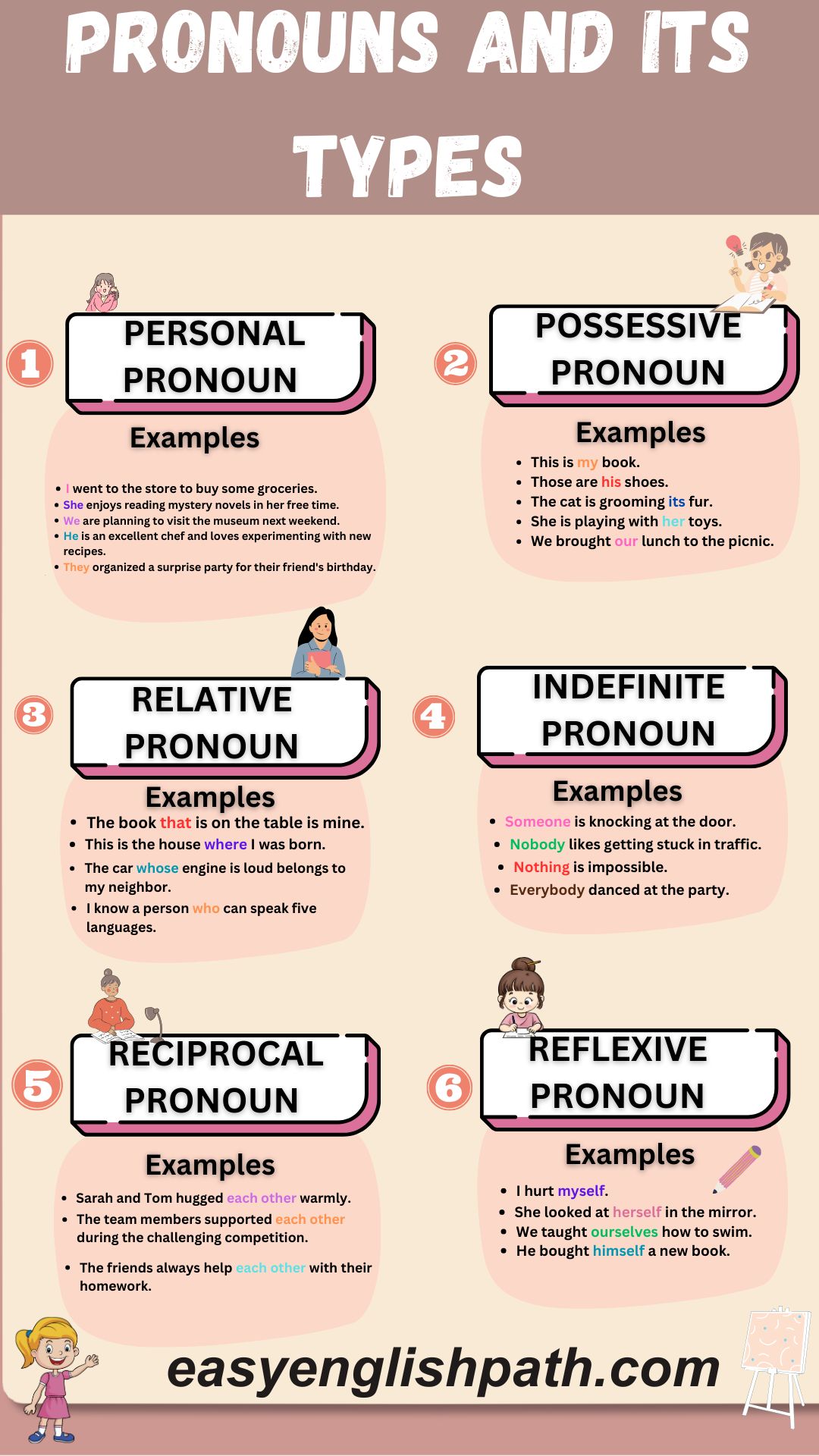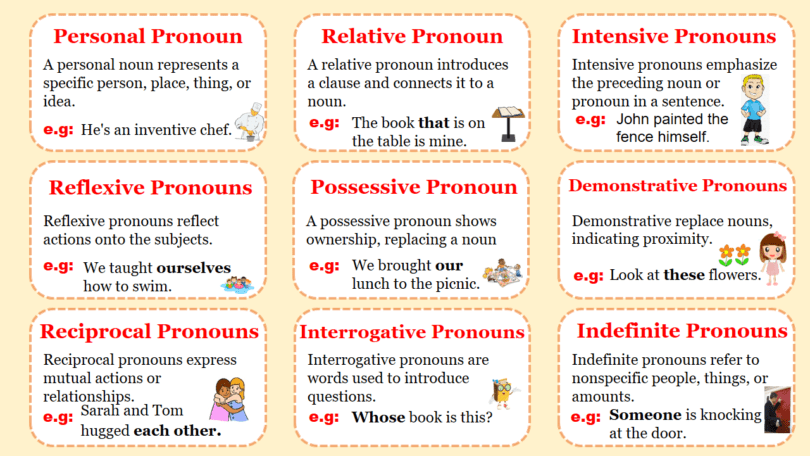Pronouns are words in grammar that are used to replace names of people, objects, and animals. When we don’t wish to use someone’s name repeatedly, we simply use pronouns. A pronoun is referred to people as a noun. Pronouns function all those which a noun does. Remember that pronouns are a vital part of part of speech and they should be used correctly to improve writing and speech.

Definition of Pronoun:
A pronoun is a word that replaces a noun to avoid repetition. So, instead of saying someone’s name or something specific every time, you use words like he, she, it, or they are used to refer back to that person or thing. It’s like avoid repeating the same words over and over again.
Types of Pronouns
- Personal pronouns
- Subject and object pronouns
- Possessive pronouns
- Reflexive pronouns
- intensive pronouns
- Impersonal pronouns
- Demonstrative pronouns
- Interrogative pronouns
- Relative pronouns
1. Personal Pronouns
A personal pronoun is a word that replaces a noun to avoid repetition. These pronouns are used to referred to people and sometimes we can refer them to animals.
Personal Pronoun Words
He, She, it, They, it, Me, Us, them
Personal Pronouns Examples
- I am going to the store.
- Could you please pass the salt?
- He is coming to the party later.
2. Possessive Pronouns
A possessive pronoun is a word that is used to indicate ownership or possession. It replaces a noun and shows who or what possesses something.
Possessive Pronoun Words
My, mine, our, ours, your, yours, his, her, hers, its, their, and theirs.
Possessive Pronouns Examples
- This book is mine, not yours.
- The red car is his, and the blue one is hers.
- Is this backpack yours or ours?
3. Subject Pronouns
A subject pronoun is a types of pronoun that replaces a noun and functions as the subject of a sentence. Subject pronouns are used to avoid repetition of a person’s or thing’s name and to make sentences more concise. These types of pronoun are used at the beginning of a sentence.
Subject Pronoun Words:
I, you, he, she, it, we, and they
Subject Pronouns Examples
- She is going to the store.
- We are studying for the exam.
- They helped me with the project.
4. Object Pronoun
An object pronoun functions as the recipient of the action in a sentence. These pronouns replace or stand in for nouns that are the objects of verbs or prepositions. Object pronouns help avoid irrelevance and make sentences more concise.
Object Pronoun Words:
Me, you, him, her, it, us, you, them
Object Pronoun Examples:
- She gave him a gift.
- They invited us to their party.
- Can you help me with this problem?
5. Relative Pronoun
A relative pronoun is a word that is used to introduce a dependent clause and relates it to a noun in the main clause. They connect phrases and provide more information about a person or thing in the sentence.
Relative Pronoun Words
That, who, which, whose, whom
Relative Pronoun Examples:
- The person who found my lost wallet is my neighbor.
- This is the cake that Mary baked for the party.
- The car, whose headlights were left on, now has a dead battery.
6. Indefinite Pronoun
An indefinite pronoun is a word that replaces a noun and does not specify a particular person, thing, or amount.
Indefinite Pronoun Words
Something, Nobody, Anyone, All, Many, Few, Anything, Nothing
Indefinite Pronoun Examples:
- Anyone can participate in the event.
- Is there something you would like to share?
- Nobody expected the sudden change in weather.
7. Reciprocal Pronoun
A reciprocal pronoun is a pronoun that is used to express a mutual action between two or more individuals.
Reciprocal Pronoun Words
Each other, One another
Reciprocal Pronoun Examples:
- They hugged each other tightly after not seeing each other for years.
- The two friends promised to always support each other through thick and thin.
- The siblings often argue with each other, but they still love each other deeply.
8. Interrogative Pronouns
These interrogative pronoun words are used to ask questions about people or things.
Interrogative Pronoun Words
Who, whose, which, what
Interrogative Pronoun Examples:
- Which of these books do you recommend?
- Who was responsible for organizing the event?
- What is the capital of France?
9. Reflexive Pronouns
Reflexive pronouns are used to refer back to the subject of a sentence or clause and indicate that the subject is performing the action on itself.
Reflexive Pronoun Words
Singular: Myself, Yourself, Himself, Herself, Itself
Plural: Ourselves, Yourselves, Themselves
Reflexive Pronoun Examples:
- I did the project myself to ensure its quality.
- She taught herself how to play the guitar.
- The team organized the event by themselves.
Noun vs. Pronoun
| Feature | Noun | Pronoun |
|---|---|---|
| Definition | A word that names a person, place, thing, or idea. | A word that replaces a noun to avoid repetition. |
| Example | John, city, book, happiness | He, she, they, it |
| Function | Used to identify something specifically. | Used to refer to a noun already mentioned. |
| Usage | Helps in naming things clearly. | Helps in making sentences concise and avoiding repetition. |
Example Sentences with Pronouns
- She loves to read novels in her free time.
- They went to the park to play football.
- Can you help me with this assignment?
- We enjoyed the concert last night.
- It is raining heavily outside.
- The teacher praised him for his excellent work.
- This is the best pizza I’ve ever had!
- Who is coming to the party tonight?
- The students completed the project by themselves.
- The cat, which was rescued, is now healthy.
Common Mistakes with Pronouns
1. Confusing Subject and Object Pronouns
❌ Me went to the store.
✅ I went to the store.
2. Using “They” for Singular Subjects (When Not Intended for Gender Neutrality)
❌ They is my best friend.
✅ He/She is my best friend.
3. Misusing Reflexive Pronouns
❌ John and myself went to the park.
✅ John and I went to the park.
4. Using “Who” Instead of “Whom” in Object Position
❌ Who did you invite?
✅ Whom did you invite?
5. Using “Its” Instead of “It’s” (or vice versa)
❌ It’s pages are torn.
✅ Its pages are torn. (It’s = “It is”)
FAQs About Pronouns
- What is a pronoun?
A pronoun is a word that replaces a noun to avoid repetition.
2. How many types of pronouns are there?
There are several types, including personal, possessive, reflexive, relative, interrogative, demonstrative, and indefinite pronouns.
3. What is the difference between a subject and an object pronoun?
A subject pronoun (e.g., “he”) does the action, while an object pronoun (e.g., “him”) receives the action.
4. Can “it” be used for people?
No, “it” is generally used for objects, animals, or concepts, not people.
5. What is an example of a reflexive pronoun?
I taught myself how to play the guitar.
You May Also Like





